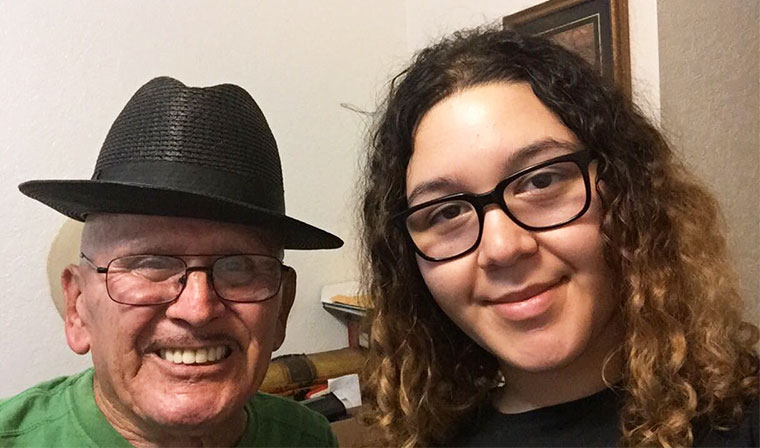DES Extends Helping Hand to Arizona Grandfather

Fernando Ibarra and his granddaughter.
There is nothing more rewarding than witnessing the positive impact your work has on someone else’s life. For Christina Weber, a member of the DES Division of Benefits and Medical Eligibility (DBME) Policy Support Team, this came to fruition while working with the Arizona Association of Food Banks (AAFB) on a special project. She recently met a client of the food bank who was struggling to make ends meet and determined that he qualified for Kinship Care.
Fernando Ibarra, a 68-year-old man with a disability, cares his 15-year-old granddaughter with the support of Social Security Disability Insurance, and resources were sparse. His eligibility for Kinship Care, a cash assistance program for individuals taking care of relatives who are not their own children, was the supplemental aid that would cushion the hardship.
Ibarra has been a resident of Arizona for over 20 years. Decades of physically demanding jobs have taken a back, and as a result, had to stop working. “I spent years picking lettuce and I ended up with no cartilage in my spine. My vertebrae were just grinding, bone on bone,” he shared. “My back hurts constantly and I have to receive electric therapy to alleviate the pain.” Having to depend on disability as a means of income was a hard transition; he came from a family with a strong work ethic, and relying on someone other than himself was a new dynamic.
In recent years, he took on the responsibility of caring for his granddaughter, which came with its own set of challenges. Qualifying for the Kinship Care program has brought much needed relief and the ability to finally take a break from the constant pressure of not knowing if they had enough to get by. “My granddaughter needed my help and I couldn’t afford the things she needed,” said Ibarra. “Knowing this program could give me access to extra money meant that I would be able to do a little more, like buy her a laptop for schoolwork or get her some nice clothes.” He continues to strive to do whatever is necessary to provide his granddaughter with the tools she needs to be successful.
The process itself was quick and efficient. Ibarra stated this would not have been possible without Weber’s help. His voice breaking, he said, “This means everything to me and my granddaughter. Knowing that there are people out there willing to look out for others and offer this kind of help is wonderful.”
Upon hearing of Ibarra’s success, Weber expressed that emotionally, she had not felt this emotionally powerful since she was a Program Services Evaluator (PSE) ten years ago when she would meet with clients directly on a daily basis, interviewing them for Nutrition, Medical and Cash Assistance. Although her work on the Policy Support Team has an impact on Arizona families and communities, she no longer has a front row seat to the influence her efforts make on clients.
“It was something that hit me, listening to his story,” said Weber. “I felt so good when I heard it. This was something I used to feel all the time when I was working in the field. Here in Policy, we don’t deal as much with these kinds of situations. I enjoyed feeling that again.”
The Kinship Care program aims to ensure children across the state have stability and access to basic needs. Any nonparent relative that is taking care of a child may be eligible for assistance. For more information on Kinship Care, call the Family Assistance Administration at (855) 432-7587, or visit your local DES office.
By Ericka Martinez

